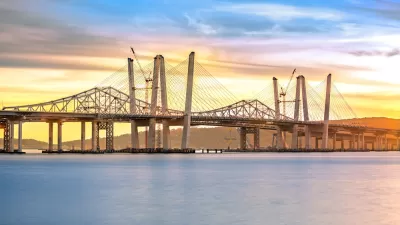The federal government approved a streamlined process to expedite the bridge's replacement. Key would be to remove transit plans for the new bridge, thus keeping costs down, but that has raised questions about not providing alternatives to driving.
The 1955 cantilever bridge is costing NY $100 million annually in repairs. Plans for its replacement or repair have long been in the works.
"Citing the bridge's deteriorating condition, the federal Department of Transportation decided it would let the state go forward with the project as long as it streamlined its earlier plan to make a new bridge a centerpiece of a $21 billion, 30-mile transportation corridor. The federal agency said it would help speed up the process for the state to build a $5.2 billion eight-lane bridge, to which mass transit could be added in the future."
"But it is not clear how much the construction may cost commuters. Jeffrey M. Zupan, a senior fellow for transportation with the Regional Plan Association, said issuing the bonds for $3 billion would mean an increase on the bridge's toll. The toll, now $5, could be raised by as much as $10 each year for the duration of the project, Mr. Zupan said. At the same time, commuters have no immediate alternatives.
"What they're basically saying to the driver is, ‘We're going to raise your toll and by the way we're not going to improve public transit,' " Mr. Zupan said. "And we're not going to give you an option other than driving."
From lohud.com: Tappan Zee Bridge project details to be unveiled at Oct. 25, 27 briefings: "By assuming the dominant role, the Federal Highway Administration will help speed up the review and approval of the project, which will no longer consider rail and bus rapid transit services along Interstate 287 through Rockland and Westchester. This will allow it to focus on building a new span over the Hudson River."
FULL STORY: U.S. Says It Will Expedite Approval to Replace Deteriorating Tappan Zee Bridge

Alabama: Trump Terminates Settlements for Black Communities Harmed By Raw Sewage
Trump deemed the landmark civil rights agreement “illegal DEI and environmental justice policy.”

Planetizen Federal Action Tracker
A weekly monitor of how Trump’s orders and actions are impacting planners and planning in America.

Why Should We Subsidize Public Transportation?
Many public transit agencies face financial stress due to rising costs, declining fare revenue, and declining subsidies. Transit advocates must provide a strong business case for increasing public transit funding.

Understanding Road Diets
An explainer from Momentum highlights the advantages of reducing vehicle lanes in favor of more bike, transit, and pedestrian infrastructure.

New California Law Regulates Warehouse Pollution
A new law tightens building and emissions regulations for large distribution warehouses to mitigate air pollution and traffic in surrounding communities.

Phoenix Announces Opening Date for Light Rail Extension
The South Central extension will connect South Phoenix to downtown and other major hubs starting on June 7.
Urban Design for Planners 1: Software Tools
This six-course series explores essential urban design concepts using open source software and equips planners with the tools they need to participate fully in the urban design process.
Planning for Universal Design
Learn the tools for implementing Universal Design in planning regulations.
Caltrans
Smith Gee Studio
Institute for Housing and Urban Development Studies (IHS)
City of Grandview
Harvard GSD Executive Education
Toledo-Lucas County Plan Commissions
Salt Lake City
NYU Wagner Graduate School of Public Service



























